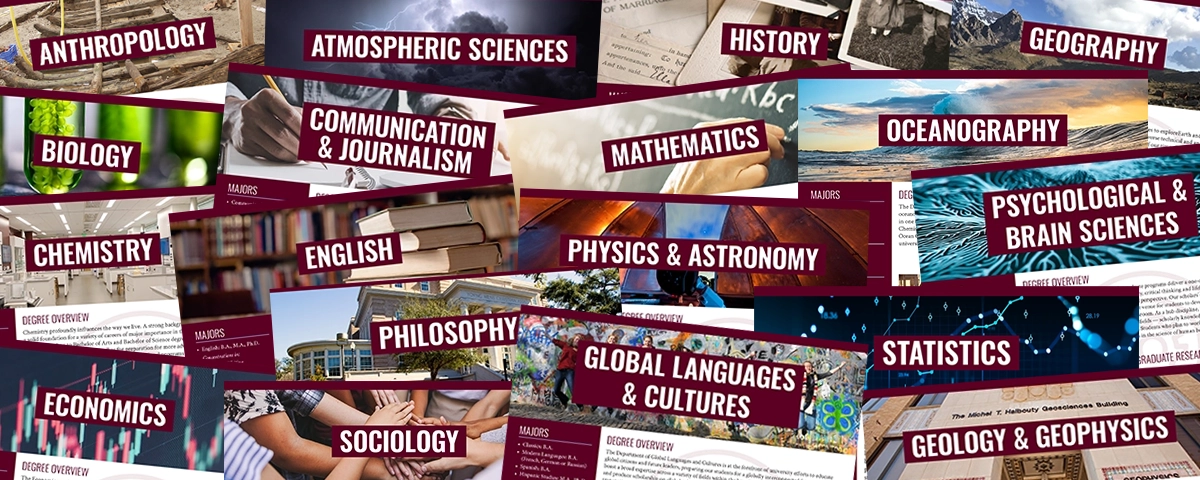Read more about department majors, minors and careers, or print a one-page flyer
-
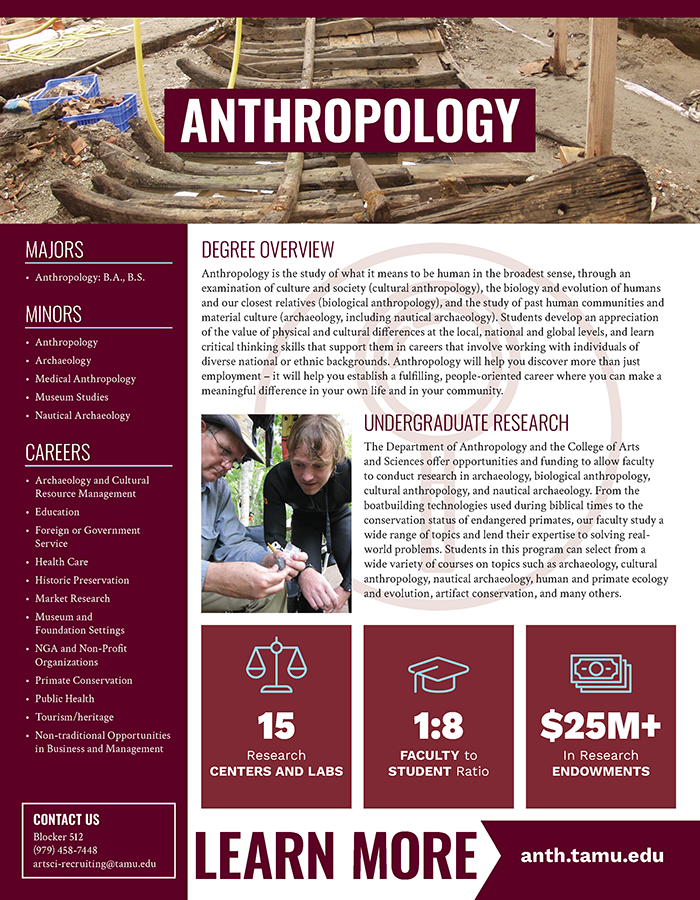 Anthropology One Page Brochure
Anthropology One Page BrochureAnthropology is the study of what it means to be human in the broadest sense, through an examination of culture and society (cultural anthropology), the biology and evolution of humans and our closest relatives (biological anthropology), and the study of past human communities and material culture (archaeology, including nautical archaeology).
Majors: Anthropology B.A., B.S.
Minors: Anthropology • Archaeology • Medical Anthropology • Museum Studies • Nautical Archaeology
Careers: Archaeology and Cultural Resource Management • Education • Foreign or Government Service • Health Care • Historic Preservation • Market Research • Museum and Foundation Settings • NGA and Non-Profit Organizations • Primate Conservation • Public Health • Tourism/heritage • Non-traditional Opportunities in Business and Management
Printable Accessible Copy Visit the Department
-
Atmospheric Sciences
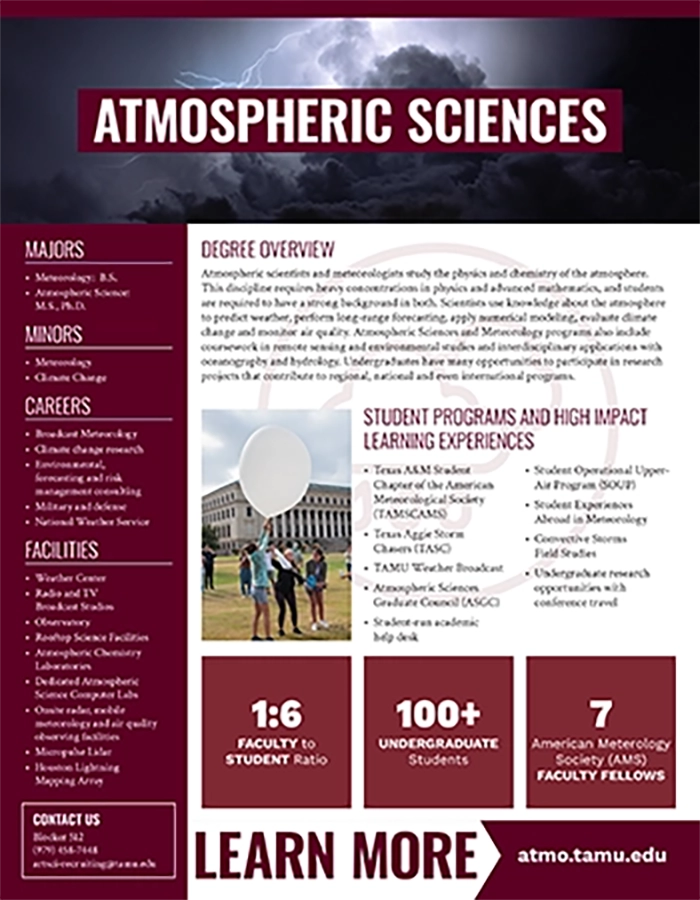 Atmospheric Sciences One Page Brochure
Atmospheric Sciences One Page BrochureAtmospheric scientists and meteorologists study the physics and chemistry of the atmosphere. This discipline requires heavy concentrations in physics and advanced mathematics, and students are required to have a strong background in both. Scientists use knowledge about the atmosphere to predict weather, perform long-range forecasting, apply numerical modeling, evaluate climate change and monitor air quality. Atmospheric Sciences and Meteorology programs also include coursework in remote sensing and environmental studies and interdisciplinary applications with oceanography and hydrology. Undergraduates have many opportunities to participate in research projects that contribute to regional, national and even international programs.
Majors: Meteorology B.S. • Atmospheric Science M.S., PhD.
Minors: Meteorology • Climate Change
Careers: Broadcast Meteorology • Climate Change Research • Environmental, Forecasting and Risk Management Consulting • Military and Defense • National Weather Service
Printable Accessible Copy Visit the Department
-
Biology
 Biology One Page Brochure
Biology One Page BrochureWe provide modern and comprehensive B.S. and B.A. curricula in biology, molecular and cell biology, microbiology, neuroscience and zoology for more than 2,000 undergraduate biology majors in tandem with exceptional networking and career development opportunities. These degrees prepare students for various life science careers and are an excellent entrée to the healthcare professions. Whether you are interested in pursuing a major in one of our disciplines or you are a current student who would like information on courses and/ or the program, we have excellent undergraduate advisors who will be happy to help you.
Majors: Biology B.A., B.S., M.S., PhD. • Microbiology B.S., M.S., PhD. • Molecular & Cell Biology B.S. • Neuroscience B.S., Molecular & Cellular Track • Zoology B.S.
Minors: Biology • Bioinformatics • Neuroscience • Pre-Medicine
Careers: Biotechnologist • Dentist • Microbiologist • Optometrist • Physician • Professor
Printable Accessible Copy Visit the Department
-
Chemistry
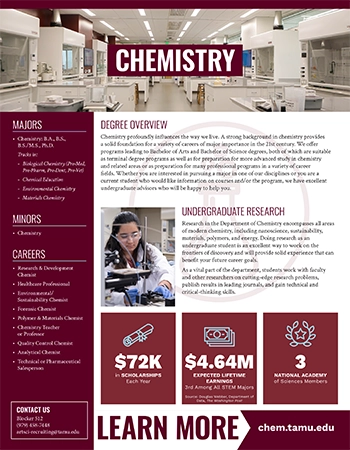 Chemistry One Page Brochure
Chemistry One Page BrochureChemistry profoundly influences the way we live. A strong background in chemistry provides a solid foundation for a variety of careers of major importance in the 21st century. We offer programs leading to Bachelor of Arts and Bachelor of Science degrees, both of which are suitable as terminal degree programs as well as for preparation for more advanced study in chemistry and related areas or as preparation for many professional programs in a variety of career fields. Whether you are interested in pursuing a major in one of our disciplines or you are a current student who would like information on courses and/or the program, we have excellent undergraduate advisors who will be happy to help you.
Majors: Chemistry B.A., B.S., B.S./M.S., PhD. • Tracks: Biological Chemistry (Pre-Med, Pre-Pharm, Pre-Dent, Pre-Vet)
Minors: Chemistry
Careers: Research & Development Chemist • Healthcare Professional • Environmental/Sustainability Chemist • Forensic Chemist • Polymer & Materials Chemist • Chemistry Teacher or Professor • Quality Control Chemist • Analytical Chemist • Technical or Pharmaceutical Salesperson
Printable Accessible Copy Visit the Department
-
Communication and Journalism
 Communication and Journalism One Page Brochure
Communication and Journalism One Page BrochureDive into the heart of human interaction and storytelling with the diverse offerings of the Department of Communication & Journalism at Texas A&M University. Choose from six undergraduate degrees, four certificates, and two minors spanning communication, journalism, and media fields. Our program includes a first-semester experience for freshmen and transfer students, an enriching internship program, opportunities to tailor your degree around marketable certificates, and exciting opportunities for study abroad and field trips. Our classes emphasize immersive experiences that can feed individual passions, equipping students with invaluable skills to comprehend, analyze, and lead in a rapidly changing world.
Majors: Communication B.A., B.S., M.A., PhD. • Telecommunication Media Studies: B.A., B.S.
Minors: Communication • Journalism
Careers: Media Analyst/Critic • Political Communication Specialist • Health Communication Coordinator • Advocacy Journalist • Crisis Communication Manager • Investigative Journalist • Communication Manager • Multimedia Content Producer • Nonprofit Communication Director • Patient Advocate • Public Relations Strategist • Sports Reporter • Podcast Creator & Producer • Graphic Designer • Event Coordinator/Planner
Printable Accessible Copy Visit the Department
-
Economics
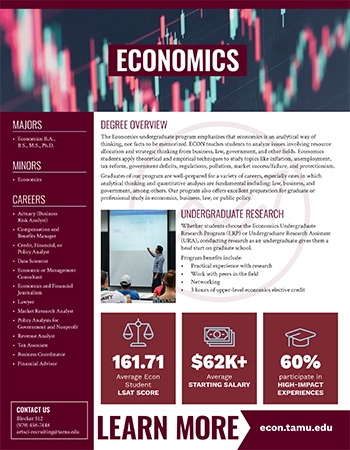 Economics One Page Brochure
Economics One Page BrochureThe Economics undergraduate program emphasizes that economics is an analytical way of thinking, not facts to be memorized. ECON teaches students to analyze issues involving resource allocation and strategic thinking from business, law, government, and other fields. Economics students apply theoretical and empirical techniques to study topics like inflation, unemployment, tax reform, government deficits, regulations, pollution, market success/failure, and protectionism. Graduates of our program are well-prepared for a variety of careers, especially ones in which analytical thinking and quantitative analysis are fundamental including: law, business, and government, among others. Our program also offers excellent preparation for graduate or professional study in economics, business, law, or public policy.
Majors: Economics B.A., B.S., M.S. PhD.
Minors: Economics
Careers: Actuary (Business Risk Analyst) • Compensation and Benefits Manager • Credit, Financial, or Policy Analyst • Data Scientist • Economic or Management Consultant • Economics and Financial Journalism • Lawyer • Policy Analysis for • Market Research Analyst Government and Nonprofit • Revenue Analyst • Tax Associate • Business Coordinator • Financial Advisor
Printable Accessible Copy Visit the Department
-
English
 English One Page Brochure
English One Page BrochureEnglish majors study the cultural production of English-speaking people across time and space, combining historical, linguistic and cultural analysis with creative work in literature, film and emerging media. Our faculty teach classes in creative writing, rhetoric, technical and professional writing, gender and women's studies, film, digital humanities, science fiction and fantasy alongside the full range of literatures and varieties of English. Exploring these rich and wide areas of inquiry, students acquire key skills – thinking critically, analyzing complex texts and contexts, communicating persuasively and appreciating the aesthetic and cultural value of literary and multimedia texts – preparing them for success in the workplace and in life.
Majors: English B.A., M.A., PhD. • Concentrations in • Creative Writing • Science Fiction and Fantasy Studies • Health Humanties • Composition and Rhetoric • Literature and Film
Minors: English • Health Humanties • Professional Writing • Science Fiction and Fantasy Studies
Careers: • Advertising • Business • Education • Law • Non-Profit/Government • Digital and Traditional Publishing • Writing and Editing
Printable Accessible Copy Visit the Department
-
Environmental Systems Science

The Bachelor of Science degree in Environmental Systems Science (BS-ENSS) offers interdisciplinary training in environmental science, systems thinking, and data analytics to tackle complex environmental challenges. The program focuses on Earth system processes and human-environment interactions, preparing students to apply quantitative skills and systems-based learning to address critical problems and challenges.
The program’s curriculum integrates theoretical knowledge with practical applications, preparing students to collect, analyze, and interpret environmental data using modern analytical tools and approaches. The program develops key competencies and skills including systems thinking, environmental data analysis, GIS and spatial analysis, climate science, environmental modeling, statistical analysis, scientific programming, data visualization, project management and research methodsDegree Requirements: 42 Hours of Core Curriculum • 50 Hours of ENSS Courses • 3 Hours of Environmental Governance • 3 Hours of Computer Programming • 19 Hours of Environmental Theme Electives • 3 Hours of General Electives
Internships: Texas Water Resources • Institute • TCEQ • Drake Environmental • EPA Water Division • Repsol Renewables • Amazon • Alaska Wildlife • Conservation Center • Harris County, District • Attorney’s Office • Terracon Consultants • North Texas Municipal • Water District
Environmental Studies

The Bachelor of Science degree in Environmental Studies (BS-ENST) blends an interdisciplinary understanding of Earth’s surface processes and environmental problems, along with the policy and decision-making components of human interactions with the environment. The degree is designed to educate students about the scientific, human-dimension and policy aspects of environmental issues facing our state and nation as they work in regulatory agencies, industry, and non-governmental organizations to resolve problems. The program stresses mastery of knowledge and skills that will position students for future success in environmental careers and for graduate and professional training in fields such as environmental consulting, public policy, journalism, education, and law.
Degree Requirements: 42 Hours of Core Curriculum • 57 Hours of ENST Courses • 15 Hours of Environmental Theme Electives • 6 Hours of General Electives
Internships: Texas Water Resources • Institute • TCEQ • Drake Environmental • EPA Water Division • Repsol Renewables • Amazon • Alaska Wildlife • Conservation Center • Harris County, District • Attorney’s Office • Terracon Consultants • North Texas Municipal • Water District
-
Geography
 Geography One Page Brochure
Geography One Page BrochureThe Department of Geography offers exciting opportunities to exploreEarth and its landscapes in the field, classroom, and laboratory. Students develop diverse technical and analytical skills necessary to understand some of the most pressing issues of our time. Geography degrees bridge environmental and social sciences, providing a unique opportunity to study people, the environment, and their relationships. Graduates of the geography programs become leaders in a diversity of fields that require creative and integrative thinking. The unique critical thinking and spatial analysis skills of geographers are in high demand by industry, non-profit, and government sectors.
Majors: Geography: B.S. • M.S., Ph.D. • Geographic Information Science & Technology (GIST): B.S.
Minors: Geography • GIST
Careers: Environmental Consulting • Earth and Environmental Sciences • Energy and Natural Resources • Urban and Regional Planning • Education • Environmental Advocacy • Geographic Information Systems (Gis) • Remote Sensing • Spatial Analysis • Intelligence Gathering
Printable Accessible Copy Visit the Department
-
Geology and Geophysics
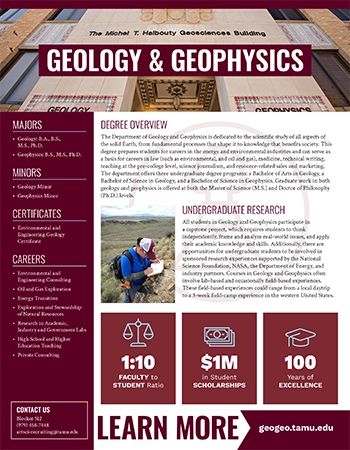 Geology & Geophysics One Page Brochure
Geology & Geophysics One Page BrochureThe Department of Geology and Geophysics is dedicated to the scientific study of all aspects of the solid Earth, from fundamental processes that shape it to knowledge that benefits society. This degree prepares students for careers in the energy and environmental industries and can serve as a basis for careers in law (such as environmental, and oil and gas), medicine, technical writing, teaching at the pre-college level, science journalism, and resource-related sales and marketing. All students in Geology and Geophysics participate in a capstone project, which requires students to think independently, frame and analyze real-world issues, and apply their academic knowledge and skills. Additionally, there are opportunities for undergraduate students to be involved in sponsored research experiences supported by the National Science Foundation, NASA, the Department of Energy, and industry partners.
Majors: Geology: B.A., B.S., M.S., Ph.D. • Geophysics: B.S., M.S., Ph.D.
Minors: Geology • Geophysics Certificates: Environmental and Engineering Geology
Careers: Environmental and Engineering Consulting • Oil and Gas Exploration • Energy Transition • Exploration and Stewardship of Natural Resources • Research in Academic, Industry and Government Labs • High School and Higher Education Teaching • Private Consulting
Printable Accessible Copy Visit the Department
-
Global Languages and Cultures
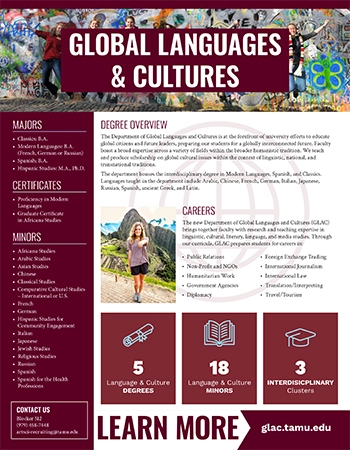 Global Languages & Cultures One Page Brochure
Global Languages & Cultures One Page BrochureThe Department of Global Languages and Cultures is at the forefront of university efforts to educate global citizens and future leaders, preparing our students for a globally interconnected future. Faculty boast a broad expertise across a variety of fields within the broader humanistic tradition. We teach and produce scholarship on global cultural issues within the context of linguistic, national, and transnational traditions. The department houses the interdisciplinary degree in Modern Languages, Spanish, and Classics. Languages taught in the department include Arabic, Chinese, French, German, Italian, Japanese, Russian, Spanish, ancient Greek, and Latin.
Majors: Classics: B.A. • Mondern Languges: B.A. (French, German or Russian) • Spanish: B.A. • Hispanic Studies: M.A., PhD. Certificates: Proficiency in Modern Languages • Graduate Certificate in Africana Studies
Minors: Africana Studies • Arabic Studies • Asian Studies • Chinese • Classical Studies • French • German • Italian • Japanese • Comparative Cultural Studies – International or U.S. • Hispanic Studies for Community Engagement • Jewish Studies • Religious Studies • Russian • Spanish • Spanish for the Health Professions
Careers: Public Relations • Non-Profit and NGOs • Humanitarian Work • Government Agencies • Diplomacy 5 Language & Culture DEGREES 18 Language & Culture MINORS • Foreign Exchange Trading • International Journalism • International Law • Translation/Interpreting • Travel/Tourism
Printable Accessible Copy Visit the Department
-
History
 History One Page Brochure
History One Page BrochureHistory seeks to broaden and deepen our understanding of the past and prepare students to engage with the increasingly complex, globalizing present. The faculty teach over 100 undergraduate courses on peoples, ideas and cultures from around the world and across the ages. Graduates with a degree in history not only make informed global citizens, but possess the intellectual competencies that many employers continue to value above all others. The ability to form questions, root out evidence, identify patterns, distinguish cause from effect, draw provable conclusions and write elegantly will distinguish you in any professional setting. It equips you for success in fields from public service to business.
Majors: History: B.A., B.S., M.A., Ph.D.
Minors: History
Careers: Library and Museum • Business • Education • Government • Journalism • Law • Non-Profit Associations • Public Policy • Public Service • Research
Printable Accessible Copy Visit the Department
-
Mathematics
 Mathematics One Page Brochure
Mathematics One Page BrochureMathematics and its applications play a fundamental role in any area of human activity, from purely scientific enterprises to the financial and business world. The analytical and quantitative skills acquired with rigorous mathematical training provide diverse career opportunities, including jobs in academia, industry and government labs, actuarial companies, the financial market, high-tech and computer-security companies, conservation and environmental agencies, energy, and many others. These positions rank near the top in career satisfaction surveys.
Majors: Applied Mathematics: B.S. Emphasis in: Actuarial Science • Biological Sciences • Computational Science • Cryptography • Economics • Mathematics • Statistics. Mathematics: B.A., B.S., M.S., PhD.
Minors: Mathematics
Careers: Actuary • Biometrician • Computer Analyst • Financial Analyst • Mathematician • National Security Analyst • Software Engineer • Teacher/Professor
Printable Accessible Copy Visit the Department
-
Oceanography
 Oceanography One Page Brochure
Oceanography One Page BrochureThe Department of Oceanography offers Bachelor of Science and Bachelor of Arts degrees in oceanography and ocean studies respectively. The B.S. degree offers interdisciplinary education in one of four concentrations in ocean science: Marine Ecosystem Processes (MEP), Marine Chemistry and Geochemistry (MCG), Ocean Observing Systems and Technology (OOST), Ocean Climate (OC). Meanwhile, the B.A. program combines oceanographic knowledge with a university-approved minor, focusing on areas crucial to the growing Blue Economy. Oceanography explores the world to investigate the defining questions of the oceans’ future, present, and past. Four affiliated centers enhance the research opportunities and access to equipment and seagoing expeditions: the Geochemical and Environmental Research Group (GERG), the International Ocean Discovery Program (IODP), Texas Sea Grant, and the Radiogenic Isotope Geosciences Facilty (RIGF).
Majors: Oceanography: B.S.; Ocean Studies: B.A.
Minors: Oceanography
Careers: Marine Operations • Homeland Security • Water Quality Monitoring • Oil Spill Response • Coastal Planning • Forecasting Hazards • Search and Rescue • Human Resiliency and Recovery • Environmental Policy • Professional Graduate Schools
Printable Accessible Copy Visit the Department
-
Philosophy
 Philosophy One Page Brochure
Philosophy One Page BrochurePhilosophers have long asked key questions, evaluated possibilities and arrived at those answers that have shaped and reshaped who we are, how we do things, and how we understand the world in which we live. The study of philosophy transforms intellectual curiosity into a potent, flexible set of skills by cultivating the ability to identify unstated assumptions, to take a critical attitude toward the information that others accept, and to evaluate and articulate the reasons that compel us to do and believe things. In addition to history and logic, students are free to select among a range of courses that allow them to better understand the limits of knowledge, the limits of scientific thinking, the theories behind our legal and political system, the foundations of ethics and more. Nationally, philosophy majors score near the top in entrance exams for graduate and professional schools, including the GRE, LSAT and GMAT. They also boast high salary growth and strong mid-career salaries.
Majors: Philosophy: B.A., B.A./M.A.; University Studies (Society, Ethics, and the Law): B.A.
Minors: Philosophy Certificates: Pre-Law Certificate
Careers: Teaching • Medicine • Law • Computer Science • Management • Publishing • Sales • Government Service • Criminal Justice • Public Relations
Printable Accessible Copy Visit the Department
-
Physics and Astronomy
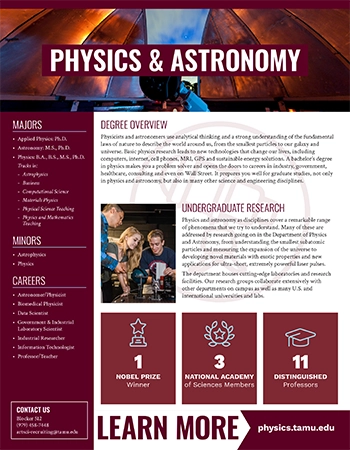 Physics & Astronomy One Page Brochure
Physics & Astronomy One Page BrochurePhysicists and astronomers use analytical thinking and a strong understanding of the fundamental laws of nature to describe the world around us, from the smallest particles to our galaxy and universe. Basic physics research leads to new technologies that change our lives, including computers, internet, cell phones, MRI, GPS and sustainable energy solutions. A bachelor’s degree in physics makes you a problem solver and opens the doors to careers in industry, government, healthcare, consulting and even on Wall Street. It prepares you well for graduate studies, not only in physics and astronomy, but also in many other science and engineering disciplines. The department houses cutting-edge laboratories and research facilities. Our research groups collaborate extensively with other departments on campus as well as many U.S. and international universities and labs.
Majors: Applied Physics: Ph.D.; Astronomy: M.S., Ph.D.; Physics: B.A., B.S., M.S., Ph.D. Tracks in: Astrophysics • Business • Computational Science • Materials Physics • Physical Science Teaching • Physics and Mathematics Teaching
Minors: Astrophysics, Physics
Careers: Astronomer/Physicist • Biomedical Physicist • Data Scientist • Government & Industrial Laboratory Scientist • Industrial Researcher • Information Technologist • Professor/Teacher
Printable Accessible Copy Visit the Department
-
Psychological and Brain Sciences
 Psychological & Brain Sciences One Page Brochure
Psychological & Brain Sciences One Page BrochureThe Psychological and Brain Sciences undergraduate programs deliver a one-of-a-kind education encouraging strong communication skills, creativity, critical thinking and lifelong learning while promoting the development of a broad intellectual perspective. Our scholars’ combined expertise and innovative research programs provide an excellent venue for students to develop their intellectual and professional skills, both in and out of the classroom. As a hub discipline, Psychological and Brain Sciences research and theories influence multiple fields — scholarly knowledge that has become increasingly central to public policy and industry. Students who plan to work with or develop innovations for people benefit from a foundation in the science of human behavior.
Majors: Psychology: B.A., B.S.; Neuroscience: B.S., Behavioral & Cognitive Track
Minors: Psychology
Careers: Counseling • Criminal Justice • Data Analysis • Education • Human Resources • Law School • Management • Marketing • Medical School • Rehabilitation • School Psychology • Scientific Research • Social Services
Printable Accessible Copy Visit the Department
-
Society, Ethics, and Law
 Society, Ethics, and Law One Page Brochure
Society, Ethics, and Law One Page BrochureSociety, Ethics, and Law (SEAL) is an ideal program for students who wish to understand our social, legal and political institutions and to imagine how those institutions could be improved. SEAL is a versatile multi-disciplinary major. Students take courses on moral, social, political and legal philosophy; as well as complementary courses in history and social science. SEAL students are able to tailor the degree to their interests with more than a semester’s worth of general electives, research opportunities and an internship. The major is a great fit for students who love to read, think critically and write about the complex problems society faces today.
Majors: Society, Ethics, and Law: B.A.
Related Certificates: Philosophy Pre-Law Certificate; Legal History Certificate; Communication Leadership and Conflict Management
Placements: University of Texas School of Law • Texas A&M School of Law • Southern Methodist University School of Law • Baylor University School of Law• University of Georgia School of Law • Texas A&M Mays Business School • Dallas Theological Seminary • Wunder Capital • U.S. Air Force • Texas Senate
Printable Accessible Copy Visit the Department
-
Sociology
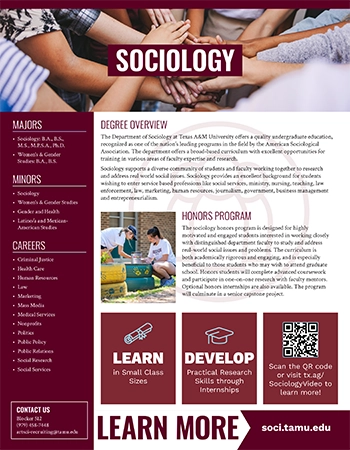 Sociology One Page Brochure
Sociology One Page BrochureSociology supports a diverse community of students and faculty working together to research and address real world social issues. Sociology provides an excellent background for students wishing to enter service based professions like social services, ministry, nursing, teaching, law enforcement, law, marketing, human resources, journalism, government, business management and entrepreneurialism. The sociology honors program is designed for highly motivated and engaged students interested in working closely with distinguished department faculty to study and address real-world social issues and problems. Honors students will complete advanced coursework and participate in one-on-one research with faculty mentors.
Majors: Sociology: B.A., B.S., M.S., M.P.S.A., Ph.D.; Women's & Gender Studies: B.A., B.S.
Minors: Sociology, Women's & Gender Studies, Gender and Health, Latino/a and MexicanAmerican Studies
Careers: Criminal Justice • Health Care • Human Resources • Law • Marketing • Mass Media • Medical Services • Nonprofits • Politics • Public Policy • Public Relations • Social Research • Social Services
Printable Accessible Copy Visit the Department
-
Statistics
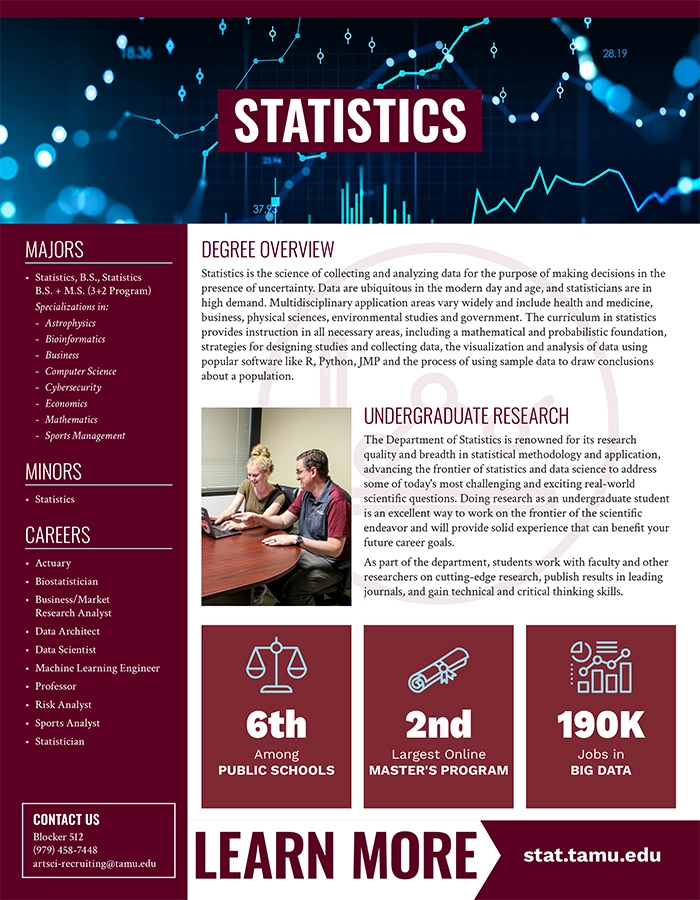 Statistics One Page Brochure
Statistics One Page BrochureStatistics is the science of collecting and analyzing data for the purpose of making decisions in the presence of uncertainty. Data are ubiquitous in the modern day and age, and statisticians are in high demand. Multidisciplinary application areas vary widely and include health and medicine, business, physical sciences, environmental studies and government. The curriculum in statistics provides instruction in all necessary areas, including a mathematical and probabilistic foundation, strategies for designing studies and collecting data, the visualization and analysis of data using popular software like R, Python, JMP and the process of using sample data to draw conclusions about a population.
Majors: Statistics, B.S., Statistics B.S. + M.S. (3+2 Program) Specializations in: Astrophysics • Bioinformatics • Business • Computer Science • Cybersecurity • Economics • Mathematics • Sports Management
Minors: Statistics
Careers: Actuary • Biostatistician • Business/Market Research Analyst • Data Architect • Data Scientist • Professor • Machine Learning Engineer • Risk Analyst • Sports Analyst • Statistician
Printable Accessible Copy Visit the Department
-
Women's and Gender Studies
 Women's and Gender Studies One Page Brochure
Women's and Gender Studies One Page BrochureWomen’s and Gender Studies is an interdisciplinary program devoted to the critical analysis of gender and the pursuit of knowledge about women throughout history and around the world. Our courses provide fresh perspectives on the nature of gender as it intersects with race, ethnicity, class, religion, and nation, and encourage students to look beyond their own culture and era in examining gender’s role in shaping society.
Through interdisciplinary study and an emphasis on critical thinking, our program prepares students as members of a diverse and complex workforce in a wide variety of fields. The Women's and Gender Studies Program offers an intimate college experience - with small classes where you know your professors and classmates - within a large, world renowned university. The best of both worlds!Majors: B.A. in Women's and Gender Studies • B.S. in Women's and Gender Studies
Certificates: Women's and Gender Studies Graduate Certificate
Minors: Women's and Gender Studies • Gender and Health
Courses: Psychological Aspects of Human Sexuality • Gender and Health • Psychology of Women • Women in Ancient Greece
and Rome • Sex, Gender, and Cinema • Reproduction, Birth,
and Power • Gender and CrimePrintable Accessible Copy Visit the WGST Program

